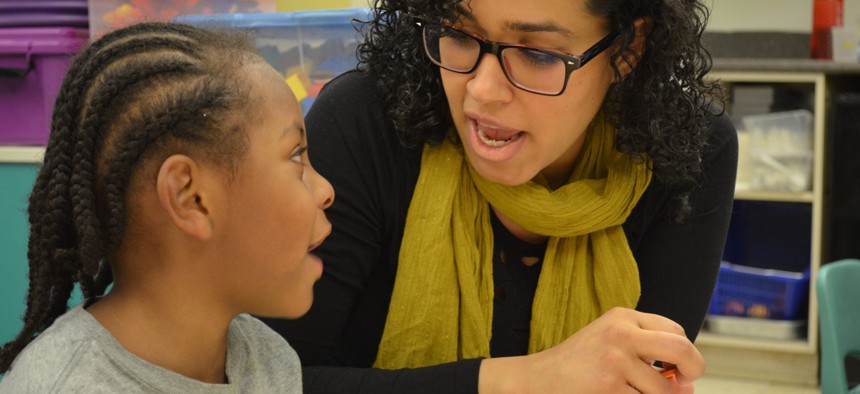Salary disparities are hurting special education students too
Providers can no longer recruit and retain certified teachers due to the dramatic disparity in pay and benefits.

Young male child observes teacher. IAC
On June 28, New York Nonprofit Media’s piece on a New York City Council Education Committee hearing titled New York City Nonprofits continue push to raise pay for early childhood educators chronicled the disparity in pay between nonprofit staff at child care, Head Start and pre-K programs and their counterparts at the New York City Department of Education. The article rightly illustrated that while community based organizations provide the exact same educational experience as DOE schools, and their teachers must possess the same certifications and qualification as teachers employed by the DOE, the starting pay and continued salary growth for a DOE teacher has many nonprofit schools losing teachers at an alarming rate.
This threatens the very existence of these schools and the children’s right to an early childhood learning experience.
However there is another facet of this story to be drawn out. Chris Treiber, associate executive director for children’s services at the InterAgency Council of Developmental Disabilities Agencies, also presented at the hearing. Treiber pointed out a similar and appalling trajectory among nonprofit special education school providers certified as 4,410 preschools and 853 schools that has been playing out for more than a decade.
Children who attend these schools are public school children with cognitive disabilities, many of them have also been diagnosed with autism spectrum disorder, cerebral palsy or physical disabilities. They are placed by their school district's Committee on Preschool Special Education or Committee on Special Education only after all public settings have been considered and determined as not able to meet the needs of the student. These schools have been inadequately funded for years and as a result, they can no longer recruit and retain certified teachers due to the dramatic disparity with the DOE in pay and benefits.
Based on data we received from the New York State Education Department, special education teachers working in 4410 and 853 programs in New York City are paid on average $25,000 to $30,000 less than teachers with the same credentials, certifications and experience who work at the DOE.
Without certified teaching staff, schools will close classrooms. Statewide, we have seen 60 preschools over the last three-and-a-half years close their doors altogether. New York City alone lost 31 of these schools.
Special education schools who serve these public school children on behalf of New York City and state will not survive much longer. Schools that are forced to close because there are no available certified teachers further inflame the crisis. What will the Committee on Preschool Special Education and Committee on Special Education do when there are no suitable placement options left for children with special needs?
To document the severity of the crisis, the InterAgency Council of Developmental Disabilities Agencies in New York has been conducting surveys of our nonprofit special education providers over the past few years. We are seeing rapid increases in the level of turnover and vacancy rates for certified teachers and certified teaching assistants as they seek better pay for this demanding work.
Based on data from these schools, we have determined that the average turnover rates for certified special education teachers in both 4,410 and 853 programs ranged from 26 percent to 31 percent. In four New York City preschool programs, the turnover rate was more than 50 percent – meaning they lost half their teachers in less than one year. Why? They went to work for either the city DOE or the even better funded suburban school districts.
There is great anxiety within the community of those that serve some of society’s most vulnerable children. The exodus of our veteran and highly skilled teachers leave children with the highest level of educational need to be taught by new and inexperienced teachers.
Without better funding to attract and retain qualified teachers, students will not meet their special education goals as indicated in their Individualized Education Programs, nor will they have access to federal requirements for a Free Appropriate Public Education under the Individuals with Disabilities Education Act.
We support all teachers regardless of where they teach, and we applaud community based organizations for advocating for their teaching staff. However, if there is no ability or will to also address the disparity in pay and benefits for teachers in nonprofit special education schools, there will be even more extensive losses in our school programs, and our children and families will bear the brunt of such failure.
We call on all of our public officials to remember that our kids are your kids.
NEXT STORY: Collaborations could work for your nonprofit
